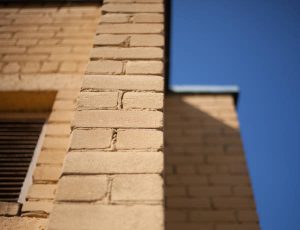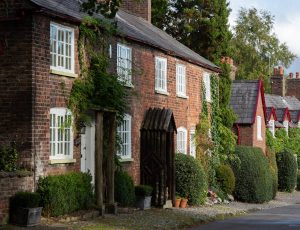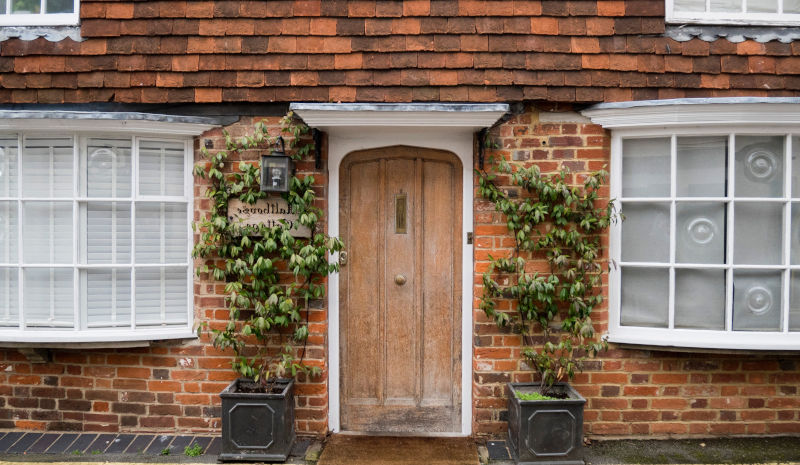Brick veneer has been a popular decorative finish in houses for decades. We still see it everywhere today and it’s just as fashionable as ever—but how long does brick veneer last?
If properly installed, a brick veneer house can last for decades. Brick veneer is not only a beautiful finish, but it’s virtually maintenance-free, extremely durable and has even been shown to increase a home’s value. The siding itself and a brick veneer house can last for up to 50 years on average.
Many purists will surely prefer real brick, but the fact is that brick veneer is one of the most durable house building materials out there. Read on to find out more.
How long do brick veneer houses last?
A brick veneer house can last 50-100 years if made with the best quality material. Its lifespan does depend on the quality of the brick. As brick veneer is thin sheets of brick, they are expected to be less durable than solid brick.
Bricks are porous, meaning they’re able to absorb water. Cheap bricks do so excessively. Quality, denser bricks do not soak up so much water and are able to sufficiently dry out without becoming flooded. These bricks will be able to last longer than cheaper bricks, which is optimal for your house strength and lifespan.
When talking about how long a particular building material can last, it’s important to understand that it varies depending on material quality. Bricks are available in many different levels of quality, which is why you should research before deciding on which brick to use. Their quality will naturally affect how long a brick veneer house lasts.
Does the weather impact the lifespan of brick veneer?
 The weather will impact the lifespan of brick veneer, but you may only notice it if you live in the same house for many decades. This impact can build slowly over time and causing it to be barely noticeable for a very long period.
The weather will impact the lifespan of brick veneer, but you may only notice it if you live in the same house for many decades. This impact can build slowly over time and causing it to be barely noticeable for a very long period.
The weather affects almost every building exterior to some degree. For the most part, brick veneer is capable of handling the same adverse weather as ordinary brick. One of the most important things is keeping moisture out. If you live in an area with high rainfall, it’s even more important that the brick is of solid quality. If not, it will absorb water which can cause mould and dampness. In colder weather this water can freeze inside the bricks, causing severe damage in some cases. This weather damage greatly impacts the lifespan of a house.
But even in extremely poor weather conditions, one distinct advantage of brick veneer is that it needs very little maintenance. By sticking to the minor maintenance required for brick veneer, you will reduce the impact of the weather on the bricks. This will allow your house to hopefully last its full lifespan.
Are brick veneer houses common in Ireland?
Brick veneer has become so commonplace as a building material in certain parts of Ireland over the last few decades. It is so prominent that people comment on its ‘overuse’ throughout the past twenty years. Why exactly this is the case is a point of debate, but many believe it’s because brick represents quality to many parts of the country. Oddly enough though, even with the high demand for brick houses, there is a bricklayer shortage in Ireland.
In any case, they are not exaggerating. Particularly in Dublin, but also all over the country, brick, block and render veneer are used extensively for cladding of timber frame buildings.
Brick is a readily available and affordable material, so its use is common everywhere, really.
How do you maintain brick veneer?
 Brick veneer is actually an incredibly low maintenance siding. Most of the time, you can just leave it be.
Brick veneer is actually an incredibly low maintenance siding. Most of the time, you can just leave it be.
Periodic cleaning should be done, though. One of the problems you may find is mould, as we mentioned. If you see signs of mould, be sure to safely clean mould off as soon as you can.
Whenever you do clean your brick veneer, make sure to only use suitable cleaning products. Using improper materials can cause damage to the bricks and is one of the most common problems with maintaining brick veneer. A coco fibre masonry brush is great for scrubbing brick veneer.
Power washes and acid washes are among the most common errors. Harsh cleaning methods like this can strip away the hardened surface created when the material was first fired. Without this surface, the veneer can become soft and damaged. Use a garden hose and a cleaning product designed specifically for brick veneer.
But if you do it right when it needs to be done, you shouldn’t need to clean your brick veneer very often.
Is brick veneer a good investment?
When considering whether any building material is a good investment, the most important point is about quality. For the most part, brick veneer is a good investment. It’s a solid and durable material. While it may not last as long as a solid brick house, adding brick veneer to an existing house can greatly improve the house’s lifespan.
If you are considering buying a house built with brick veneer, then, again, good quality brick veneer houses are a great investment. Sometimes these houses can be thrown up for low costs at mediocre quality. But if you know how to look out for these signs, you’ll be able to tell solid veneer from cheap veneer.
Ultimately, brick veneer is a good investment when considered in its own right. Comparing it to other, more solid materials you can see that they would last longer and therefore would be considered a “better” investment. Budgets are, of course, relative, and for someone whose budget can’t accommodate a solid brick house, a brick veneer house is a great alternative.
Are you still unsure of whether brick veneer is the right option for you? We discuss the benefits of brick veneer compared to cladding. Paragon Masonry Tools Ireland provides quality bricklaying and masonry tools for your building needs. If you’re needing some help or advice, contact us today! Ph: 087 161 8836



